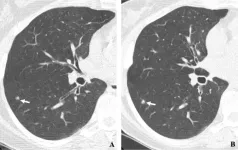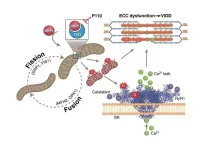Under strict embargo: 16:00hrs GMT Tuesday 7 November 2023
Peer reviewed
Observational study
People
Body changes up to eight years before inflammatory bowel disease diagnosis
Researchers at the Francis Crick Institute and Aalborg University in Copenhagen have shown that changes can be detected in blood tests up to eight years before a diagnosis of Crohn’s disease and up to three years before a diagnosis of ulcerative colitis.
This means the beginnings of inflammatory bowel diseases start a long time before symptoms occur, and in the future may provide an opportunity for doctors to take preventative action before symptoms begin, or prescribe medication when it will be most effective.
Crohn’s disease and ulcerative colitis are collectively known as inflammatory bowel diseases (IBD). They are incurable conditions which involve excessive inflammation in the gut, leading to symptoms like abdominal pain and diarrhoea. Early diagnosis and treatment are key to improving outcomes, but nearly a quarter of the 25,000 people diagnosed each year in the UK wait over a year1.
In their study published today in Cell Reports Medicine, the team used electronic health records from people in Denmark, comparing 20,000 people with an IBD diagnosis with controls from 4.6 million people without IBD.
It was previously thought that most people have symptoms for about a year before diagnosis, but significant bowel damage is often seen, suggesting that changes have been taking place for a lot longer.
The researchers confirmed this by looking at ten years of test results before diagnosis. They observed changes in a series of minerals, cells in the blood and markers of inflammation, such as faecal calprotectin, a molecule released into the gut during inflammation and currently used to determine which people with bowel symptoms need further investigations2. These changes were observed up to eight years before diagnosis in Crohn’s disease and three years in ulcerative colitis.
Importantly, most of the changes observed were subtle and would have appeared within a normal range for standard blood tests, so wouldn’t have been flagged as a cause for concern. It required a huge dataset to be able to detect these changes across many different markers.
The researchers’ next steps are to investigate if treatment or prevention has an impact before people get symptoms, and whether the findings from this research could be developed further to predict who will develop IBD in the future.
First author, Marie Vestergaard, PhD student at the Center for Molecular Prediction of Inflammatory Bowel Disease, PREDICT, at Aalborg University, said: “So many young people are affected by IBD. Their lives, hopes and aspirations for the future are turned upside down by a diagnosis and trying to live with a chronic disease. As a young person myself, it gets me. I am happy that our research might help predicting who could potentially suffer from IBD and thus start treatment earlier which would greatly improve their quality of life.”
James Lee, Group Leader of the Genetic Mechanisms of Disease Laboratory at the Crick, said, “Our research shows that the bowel damage we’re seeing at the point of diagnosis is just the tip of the iceberg. So many changes are subtly taking place in the body before the disease takes hold.
“This has huge implications for prevention as it highlights that there’s a window of opportunity for treatment. We don’t yet know whether preventative measures like changing diet or stopping smoking would stop someone getting these diseases, but this opens the door to that possibility. It also underscores the importance of early diagnosis and treatment, as many of the changes in the gut are likely to have been happening long before people become ill.”
Tine Jess, Director at the Center for Molecular Prediction of Inflammatory Bowel Disease, PREDICT, at Aalborg University, said: “Our findings are novel and go hand-in-hand with emerging evidence that chronic inflammatory bowel diseases likely have their onset years prior to diagnosis. These incurable diseases affect young individuals and are twice as common as type 1 diabetes. Understanding the exact mechanisms behind their development is essential to ultimately prevent the diseases from occurring. Our unique Danish data resources combined with cross-disciplinary and international collaboration help answering yet unanswered questions critical for patients worldwide.”
Sarah Sleet, CEO of Crohn’s & Colitis UK, said: “There are over 500,000 people in the UK with Crohn’s and Colitis. We know that earlier diagnosis leads to better outcomes for everyone, but waiting lists for diagnostic tests can be long. Not only that, many people put off going to the GP to get their symptoms checked out - either because they don’t realise how serious they could be, or through fear or embarrassment. Anything that could potentially speed up the process of getting an accurate diagnosis is a hugely positive step in the right direction.”
-ENDS-
For further information, contact: press@crick.ac.uk or +44 (0)20 3796 5252
Notes to Editors
Reference: Vestergaard, M. et al. (2023). Characterising the pre-clinical phase of inflammatory bowel disease. Cell Reports Medicine. 10.1016/j.xcrm.2023.101263.
Campaigning for early diagnosis – Crohn’s + Colitis UK. https://crohnsandcolitis.org.uk/our-work/campaigns/earlydiagnosis
Eight years before a Crohn’s disease diagnosis, levels of leukocytes, neutrophils and platelets were higher. Seven years before, levels of CRP were higher and levels of haemoglobin were lower. Five years before, levels of monocytes were higher, and levels of iron, albumin and bilirubin were lower. Three years before an ulcerative colitis diagnosis, levels of CRP, leukocytes, neutrophils, eosinophils and platelets were higher.
The Francis Crick Institute is a biomedical discovery institute dedicated to understanding the fundamental biology underlying health and disease. Its work is helping to understand why disease develops and to translate discoveries into new ways to prevent, diagnose and treat illnesses such as cancer, heart disease, stroke, infections, and neurodegenerative diseases.
An independent organisation, its founding partners are the Medical Research Council (MRC), Cancer Research UK, Wellcome, UCL (University College London), Imperial College London and King’s College London.
The Crick was formed in 2015, and in 2016 it moved into a brand new state-of-the-art building in central London which brings together 1500 scientists and support staff working collaboratively across disciplines, making it the biggest biomedical research facility under a single roof in Europe.
http://crick.ac.uk/
END





